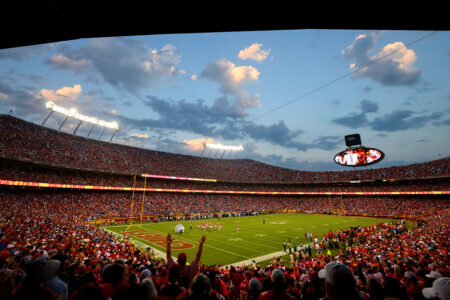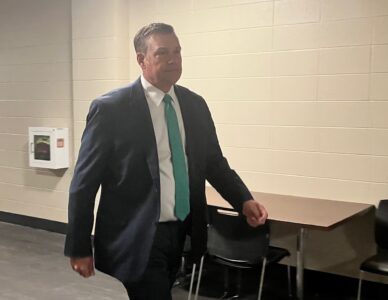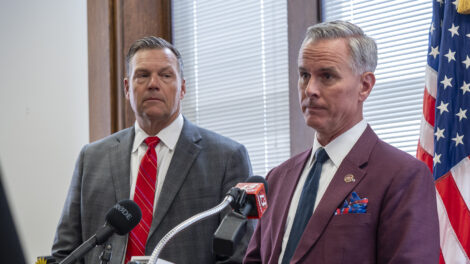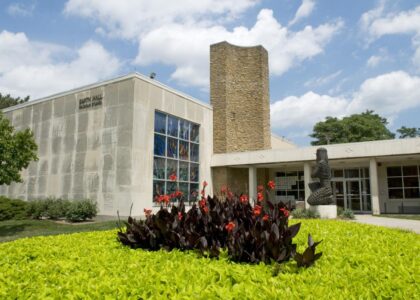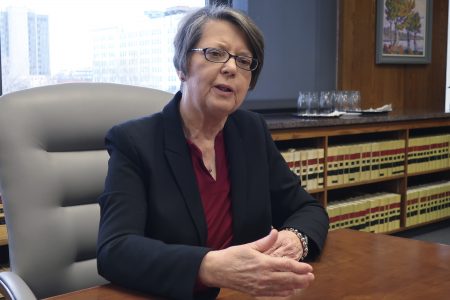Girod says KU doesn’t yet have a plan on how it would pay student-athletes in new era of college athletics

photo by: Chance Parker/Journal-World photo
From left, athletic director Travis Goff, Chancellor Douglas Girod, Governor Laura Kelly, alumnus Chris Harris Jr., head football coach Lance Leipold and running back Devin Neal look on at the unveiling of new renovations to David Booth Kansas Memorial Stadium on Aug. 15, 2023.
The financial future of college athletics is beyond murky, University of Kansas Chancellor Douglas Girod said as a legal settlement over how to pay student-athletes is at risk of collapsing.
Ever since a federal judge two weeks ago expressed concerns about a proposed settlement in the House v. NCAA antitrust lawsuit, there have been worries throughout college athletics that the court may reject any attempts to place caps on how much student-athletes can be paid.
“There is a legitimate concern,” Girod said when asked whether the House v. NCAA settlement was going to fall apart. “Opinions on that are all over the map, from ‘it is dead’ to ‘this is very fixable.'”
Girod, in a brief interview with the Journal-World, said it was clear that the NCAA and major athletic conferences did not want to go to trial in the House suit, which is a class-action suit that claims current and past student-athletes are due billions of dollars in past payments.
But the NCAA has said a settlement that doesn’t allow caps to be in place on how much schools or conferences can pay student-athletes during the course of a year is untenable. However, those caps — which would start out at roughly $20 million per year that athletic departments could pay their student-athletes in total — are what U.S. District Court Judge Claudia Wilken expressed concern about two weeks ago.
Girod said he and many others in college athletics are at a loss of what to predict if the settlement fails and schools and conferences can pay student-athletes any amount they choose.
“If the settlement doesn’t go, and (the case) does go to trial, then what do we collectively as conferences and institutions figure the path forward is, because the path we are on is not going to be viable,” Girod said.
A college athletics world where schools could pay as much as they wanted for student-athletes could make it difficult for all but a handful of the largest, richest institutions to compete, and it could put severe strain on the budgets of many universities that try to keep up.
Girod has said that it is important that general operating funds of KU not be used to subsidize the athletic department in any significant way.
Even if the settlement is allowed to move forward, the financial questions for KU are large. Girod this week reiterated that he does not see any immediate solution for how KU Athletics would come up with $20 million to pay student-athletes in the near term. The settlement would give universities the option to pay up to $20 million, but would not require them to do so. However, it is feared that schools that don’t pay the maximum will suffer in their efforts to recruit top athletes.
Girod noted that the University of Tennessee this week announced it was adding a 10% “talent fee” onto all of its ticket prices for all of its sports. The 10% fee would be used to help pay student-athletes.
Girod called the idea interesting, but did so with a laugh.
“I think you are going to see a lot of creative stuff coming out to try to manage through this,” Girod said of college athletics in general.
KU has not proposed any such plans. In fact, Kansas Athletics has not yet adopted a budget for the current year, despite its new fiscal year beginning on July 1. As the Journal-World reported in June, staff members told the Kansas Athletics governing board that they were not ready to present a budget for the new year due to several uncertainties. Kansas Athletics finished last year with a $2.1 million shortfall that had to be covered by reserves.
Girod, who sits on the Kansas Athletics board, offered no timeline for when a budget will be approved for the department. When a reporter noted that in addition to the long-term questions facing college athletics that the short-term picture also seemed a bit murky, Girod said “that is a mild understatement.”
“We do not have a source of funds to cover revenue sharing in the current environment,” Girod said. “We have a lot of work there, if that is where we are going to go.”


